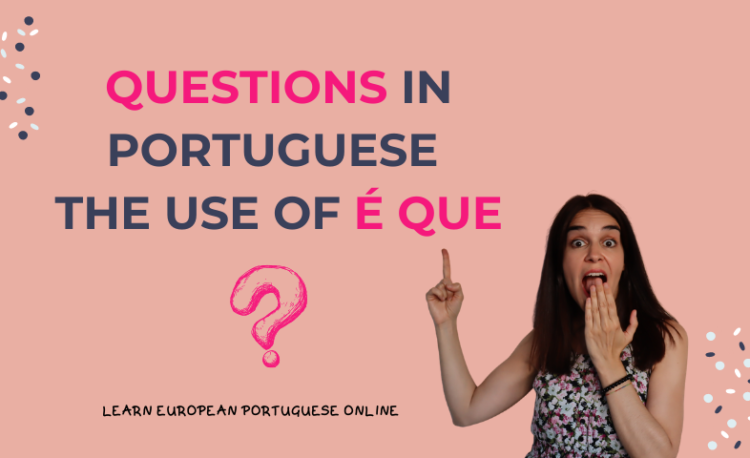Today I am going to tell you why sometimes in questions in Portuguese you see things like “o que é que é?” instead of just the more simple “o que é?”. Have you ever wondered why this is so? If you did, please keep reading as this post is for you!
Also, in case you prefer to learn about this topic in video format, feel free to check out my YouTube video here:
Asking Questions: The meaning of “é que” in Portuguese
So, you might have asked yourself: What does that “é que” mean in the sentence? The truth is it is very hard to translate. Let’s see, if we were to try to literally translate the sentence:
Onde é que tu estás?
We would have to say it is something like this:
“Where is it that you are?”
It does not make a lot of sense, right? Well, but this is really the closest I can get to “successfully” translate it…
The truth is: it does not have a meaning on itself. It just is there…
So, let us just say that the meaning of this word is not really what matters, but let us focus more of why we insert it in many of the questions we utter, shall we? O que é que achas? (ups, there it is!)

O QUE É vs O QUE É QUE É
So, about the reasons why we use “é que”…
First of all, you can see it in all “WH-questions” in Portuguese, that means you can have it with questions starting with “Quem”, “O que”, “Quando”, “Quanto”, “Onde”…and all the others. Check out the following examples:
Onde é que tu vais?
Quem é que te telefonou?
Quanto é que estas bananas custam?
O que é que ele disse?
So, why saying it like this when we could skip the “é que”? Or could we?
So, the truth is, we just use it so that we do not have to invert the sentence’s normal order.
The normal order of a sentence in Portuguese is: subject- verb- object. You can see this by the sentence:
Tu comes arroz.
But with “WH-questions” (like when, where – quando, como, etc) if you don’t have “é que”, you will have to invert the order of the question when you have an “overt” subject in the sentence (like tu, ele, você, etc).
By “having an “overt” subject” in the sentence, I mean having one of the subject pronouns in the sentence – like eu, tu, ele, nós, vocês, eles or the actual subject like “a Maria” or “as bananas” or “o arroz” in the case of the sentence above.
So, as I was explaining above, when I have a question with one of the “WH-questions”, I will have to invert the natural order of the sentence to verb- subject- object if not using “é que” and keeping the “overt subject” (with this I mean if you don’t hide the subject, as you know we can also do in Portuguese). For example, if I wanted to ask “How do you eat potatoes?” (weird question, but hey, could happen…), you would have to say:
Como comes tu batatas? (and NEVER Como tu comes batatas?)
But, changing the order is a bit troublesome for speakers (in any language a native speaker will unconsciously prefer not to have to change anything so not to spend time/ energy in the brain. It is scientifically proven by linguists! I am not making it up ;)).
So what we do is one of two things. When possible, we hide the subject, as in:
Como comes batatas? (It is still there, but it is implicit – hidden)
We can do this if it is completely obvious who/ what the subject is from context or from the conversation we had before .
If that is not the case, then we opt for the second solution, which is adding this language aid “é que”, which for some reason allows the rest of the sentence not to be inverted, like this:
Como é que tu comes batatas? (As you see we have the “WH-question”, then the normal Portuguese sentence order: subject- verb- object).

The insertion of “é que” for no apparent reason
Ok, sometimes we use it for no reason and you may say (and I agree to some extent) that this goes against that above-mentioned argument that users of a language only use the things they really need to….
Well, that is not actually the case here because we sometimes insert the ”é que” in questions even if we would not need to because we also hide the subject, as it is implicit about who/ what we are talking to/ about:
Como é que comes batatas? (As you see, we added “é que”, but there isn’t an overt subject so “é que” would not be necessary).
The only explanation I can give for this, out of the top of my head, is that this actually does not cost us more energy/ effort because we do not need to think long about it, as having “é que” in a question is always acceptable, while in some cases not having it it is not. Therefore, we just use it as a general rule and that spares us the time and effort to think about whether we should use it or not.
Now, you must be thinking: “Great! Then I will use it always and voilá! Problem solved!
Well, while this is what I normally advise my students to do “always use it, and then you know you will be right”, the truth is that when you want to speak Portuguese in a more advanced way, and when you want to have a very formal conversation, then you would probably not use it. You would opt for the inversion instead (B2 to C2 level students, this is for you ;)).
So, let’s say you are having an interview, and you would like to ask how many hours you are going to work, you would probably go for the inversion or you would just hide the subject (because you want to sound more eloquent and smart) and you would say:
Quantas horas por semana irei trabalhar? (see, no “é que”)
So, to sum up, here is the hard facts of what you can and cannot do:
- Onde comes arroz? –> RIGHT!
- Onde é que tu comes arroz? –> RIGHT!
- Onde é que comes arroz? –> RIGHT!
- Onde comes tu arroz? –> RIGHT!
- Onde tu comes arroz? –> WRONG! SUPER WRONG! DO NOT DO IT! =)
Get the picture?

I know, for someone who wants to save some energy while using the language, we have a lot of different ways to ask the same thing. But hey! I didn’t make the rules 😉
Just one last thing before I go: The last option up there that I say is wrong in European Portuguese – namely “Onde tu comes arroz?” – it is actually accepted in Brazilian Portuguese, so if you come across something like this, know that either you are in low-quality European Portuguese page/ newspaper, etc or you came across something Brazilian Portuguese 😉
Make sure to check out my European Portuguese Online Course where I explain this and many other topics in more detail.
So hey, let me know in the comments section below whether you struggle with this “é que” thing or not, and if you liked my post about it.
I hope now you can properly ask questions in Portuguese. And also, just to sound cool, you can start asking questions like: “Como é que estás?” or “Qual é que é o teu nome?” among others 😉
Beijinhos,
Mia.


Olá,
Thank you so much for posting this, as I have been wondering about this for some time as I have been studying Portuguese. If you don’t mind, I have a question (about forming questions!). When you insert “é que”, do you have to change the order of the subject pronoun? For example, could you say “Onde é que comes tu arroz?”. Or is that wrong or simply not common?
Obrigado!
Nate
Olá Nate!
That is a really interesting question =)
I have never thought about this one. So, I think it is not completely incorrect, but it is very uncommon. We use it only to give some emphasis to the subject of the sentence, in some very specific contexts. But I would not use it..
So, you can either ask:
Onde comes tu arroz?
Onde é que tu comes arroz?
Onde é que comes arroz?
Onde comes arroz?
Does this make sense? When we use “é que”, we normally leave the subject-verb normal order – first the subject, then the verb.
Obrigada pela pergunta. I hope this helps!
Beijinhos,
Mia.
Mia, I am one of those mixed, but primarily traditional, learners. I am in the basic sentence structure stage of my learning curve, such as writing/understanding “Ele come bananas” or Eu escrevo livros.” That said, I like to follow along with more advanced information, such as this blog post. What would really help me is if you put the English translation after the Portuguese sentences, even if the word order is odd. It would really help me follow along.
Will be starting a course soon.
Hi Deb!
Thank you for your comment 🙂
I think I, myself, am the same as you 🙂 , so I can see what you mean with including the English translations! I will think about that in the future.
In my online courses, I do that actually! Especially in the beginners course 🙂
Since you said you’re soon starting a course. I would like to point out we have a bundle of all the levels with 15% off at the moment.
Here is the link in case you want to check it out:
https://school.learn-portuguese.org/p/a1-a2-b1-b2-course-bundle
Again, thank you for your comment and let me know if I can help you with anything 🙂
Beijinhos,
Mia
This is really helpful, Mia. Bjs ?
Olá!
I’m glad you liked it!
Beijinhos,
Mia.
Eu adoro isto!
I have been struggling with constructing questions and it was only lately that I started to understand how to do it. However, I do need more practice, I think. Could you possibly give exercises on writing questions? I would love to practice a lot 🙂
Obrigada.
Elizabeth
Olá Elizabeth!
Good idea, I will maybe make a pdf with some exercises on the subject! Thank you for your input.
Beijinhos,
Mia.
This is a mind blowing thing to try to understand. Thanks
Some questions:
1 In your example “Como comes tu batatas? (and NEVER Como tu comes batatas?)” does that mean”how” and not ”where”?
2 Is ”’ups” a Portuguese way to say ”’oops”?
Hello! 🙂
Yes, you are right it is meant to mean “how” and not “where” and “ups” is a way to say “oops”. It’s a case to say “OOPS, my bad!” 🙂
Thank you for your input!
Beijinhos,
Mia
Well explained, thank you
Olá 🙂
I’m glad I could help!
Beijinhos,
Mia.